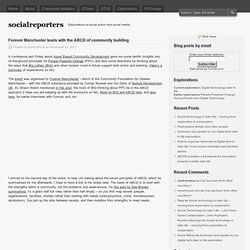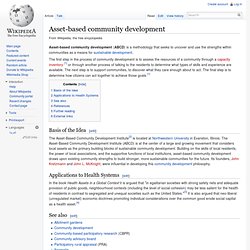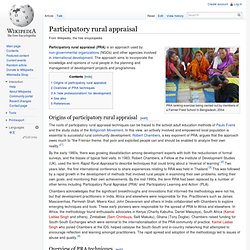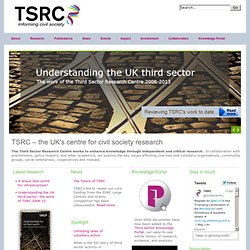

Asset-Based Community Development Institute. Asset-Based Community Development Institute. Forever Manchester leads with the ABCD of community building. A conference last Friday about Asset Based Community Development gave me some terrific insights into on-the-ground principles for People Powered Change (PPC), and also some directions for thinking about the ways that Big Lottery (BIG) and other funders could in future support both action and learning.

(Here’s a summary of explorations so far). The event was organised by Forever Manchester – which is the Community Foundation for Greater Manchester – with the ABCD substance provided by Comac Russell and Jim Diers of Nurture Development UK. As Shaun Walsh mentioned in this post, the roots of BIG thinking about PPC lie in the ABCD approach (I hope you are keeping up with the acronyms so far). More on BIG and ABCD here, and also here, for earlier interviews with Cormac and Jim. I arrived on the second day of the event, to hear Jim talking about the seven principles of ABCD, which he summarised for me afterwards.
Update: headline change to “Forever Manchester …” Asset-Based Community Development Institute. Asset-based community development. Asset-based community development (ABCD) is a methodology that seeks to uncover and use the strengths within communities as a means for sustainable development.

The first step in the process of community development is to assess the resources of a community through a capacity inventory [1] or through another process of talking to the residents to determine what types of skills and experience are available. The next step is to support communities, to discover what they care enough about to act. The final step is to determine how citizens can act together to achieve those goals.[1] Basis of the Idea[edit] The Asset-Based Community Development Institute[2] is located at Northwestern University in Evanston, Illinois. Applications to Health Systems[edit] See also[edit] References[edit] ^ Jump up to: a b McKnight, John; Kretzmann, John. Further reading[edit] External links[edit] Asset-Based Community Development Institute. Videos - ABCD Europe. Participatory rural appraisal.
PRA ranking exercise being carried out by members of a Farmer Field School in Bangladesh, 2004 Participatory rural appraisal (PRA) is an approach used by non-governmental organizations (NGOs) and other agencies involved in international development.

The approach aims to incorporate the knowledge and opinions of rural people in the planning and management of development projects and programmes. Origins of participatory rural appraisal[edit] By the early 1980s, there was growing dissatisfaction among development experts with both the reductionism of formal surveys, and the biases of typical field visits. Chambers acknowledges that the significant breakthroughs and innovations that informed the methodology were not his, but that development practitioners in India, Africa and elsewhere were responsible for this. Overview of PRA techniques[edit] A 'new professionalism' for development[edit] "The central thrusts of the [new] paradigm … are decentralization and empowerment. See also[edit] Placemaking_v1.pdf (application/pdf Object) Third Sector Research Centre - Third Sector Research Centre.
The Third Sector Research Centre works to enhance knowledge through independent and critical research.

In collaboration with practitioners, policy makers, and other academics, we explore the key issues affecting charities and voluntary organisations, community groups, social enterprises, cooperatives and mutuals. News The future of TSRC TSRC's bid to renew our core funding from the ESRC Large Centres and Grants competition has been unsuccessful. Read more... Spotlight Unfolding tales of voluntary action What is the full story of third sector activity in communities struggling to manage tough economic and social challenges?
This new monthly series will explore these issues and more, from the unique vantage point of TSRC's 'Real Times' project.